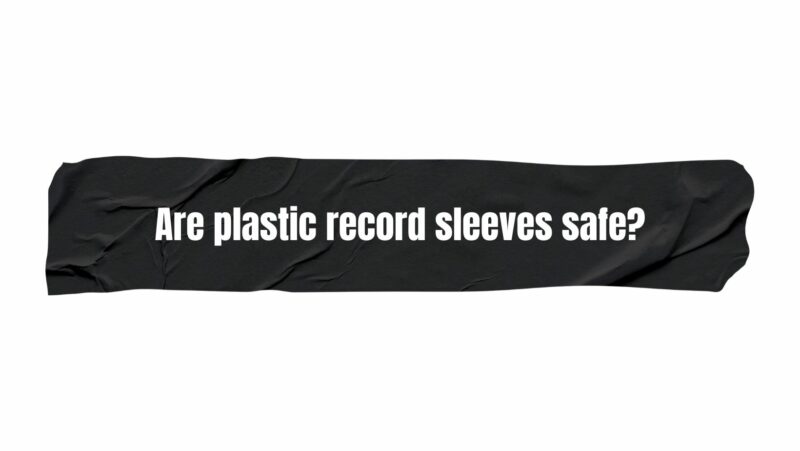The world of vinyl records has experienced a remarkable resurgence in recent years, capturing the hearts of audiophiles and music enthusiasts alike. These vintage treasures offer a warm and authentic sound that digital formats often struggle to replicate. As collectors and enthusiasts continue to amass vinyl records, the question of how to best preserve and protect these delicate artifacts arises. One of the most widely used methods for safeguarding records is the use of plastic record sleeves. However, concerns about the safety of plastic sleeves have also emerged, raising questions about their long-term impact on vinyl records. In this article, we will delve into the details surrounding the safety of plastic record sleeves, examining their benefits, potential drawbacks, and separating fact from fiction.
The Evolution of Plastic Record Sleeves
Plastic record sleeves have been a staple accessory for vinyl record collectors for decades. These sleeves were initially introduced as a replacement for the original paper sleeves that came with vinyl records. The main purpose of these plastic sleeves was to provide enhanced protection against dust, moisture, and physical damage, thus prolonging the life and quality of the vinyl record.
Benefits of Plastic Record Sleeves
- Physical Protection: Plastic sleeves offer excellent physical protection by shielding records from scratches, scuffs, and other potential damages. They act as a barrier against dust, dirt, and debris that can accumulate on the record surface, affecting both sound quality and aesthetics.
- Moisture Resistance: Vinyl records are sensitive to moisture, which can lead to warping and degradation of the grooves. High-quality plastic sleeves create a moisture-resistant barrier, preventing the intrusion of moisture and safeguarding the record’s integrity.
- UV Protection: Many modern plastic sleeves are designed with UV inhibitors, which protect records from fading and discoloration caused by prolonged exposure to sunlight or artificial light sources.
- Convenience: Plastic sleeves are easy to handle and insert, allowing collectors to quickly slide records in and out without causing damage. This convenience makes it more likely that collectors will properly protect their records.
- Customization: Some plastic sleeves come with additional features, such as resealable closures and customizable labeling options, enhancing organization and ease of access to the records.
Debunking Myths
- Chemical Reactions: One common concern regarding plastic sleeves is the possibility of chemical reactions between the plastic and the vinyl, potentially causing damage over time. However, modern plastic materials used in record sleeves are typically made from polyethylene or polypropylene, which are considered stable and safe for long-term contact with vinyl records.
- Static Electricity: Another misconception is that plastic sleeves generate static electricity that can harm the vinyl. While static can be an issue with lower-quality sleeves, many manufacturers now produce anti-static plastic sleeves designed specifically for vinyl records.
Potential Drawbacks and Considerations
- Sleeve Fit: Ill-fitting sleeves can cause friction and scratches if records are inserted or removed hastily. Choosing the correct sleeve size for the record and handling it with care can mitigate this issue.
- PVC Sleeves: Some older plastic sleeves were made from polyvinyl chloride (PVC), which can release harmful gases over time and potentially damage records. It is advisable to avoid PVC sleeves and opt for safer materials like polyethylene or polypropylene.
- Heat and Temperature: Excessive heat or temperature fluctuations can cause plastic sleeves to warp or adhere to the vinyl record. Proper storage conditions are crucial to avoid this issue.
Conclusion
Plastic record sleeves have come a long way since their introduction, offering valuable protection and preservation benefits to vinyl record collectors. Advances in material science have led to the development of safe and high-quality plastic sleeves that address concerns about chemical reactions and static electricity. While it’s important to choose the right type of plastic sleeve and handle records with care, the overall benefits of using plastic sleeves outweigh the potential drawbacks.
For enthusiasts looking to preserve the quality and longevity of their vinyl record collections, plastic sleeves remain a reliable and effective solution. With proper handling, storage, and consideration for the type of plastic used, collectors can enjoy the nostalgic crackles and pops of vinyl records for years to come, safe in the knowledge that their cherished collections are well protected.

